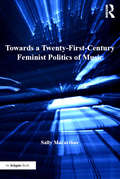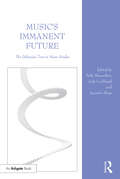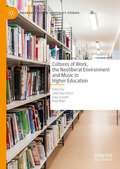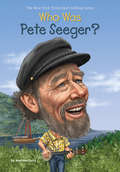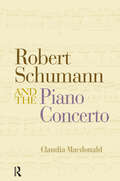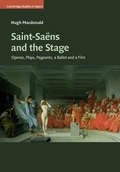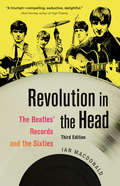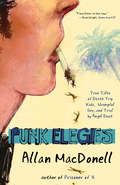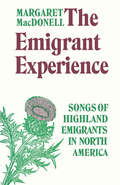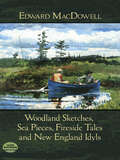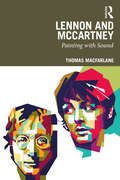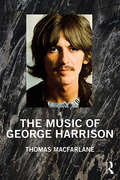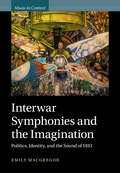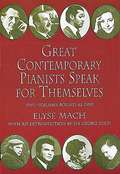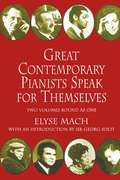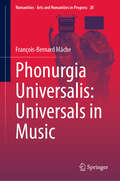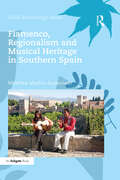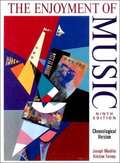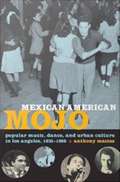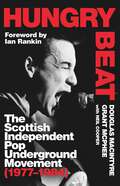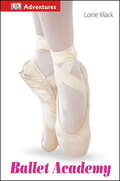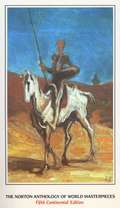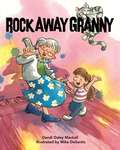- Table View
- List View
Towards a Twenty-First-Century Feminist Politics of Music
by Sally MacarthurTowards a Twenty-First-Century Feminist Politics of Music opens up a new way of thinking about the absence of women's music. It does not aim to find 'a solution' in a liberal feminist sense, but to discover new potentialities, new possibilities for thought and action. Sally Macarthur encourages us, with the assistance of Deleuze, and feminist-Deleuzian work, to begin the important work of imagining what else might be possible, not in order to provide answers but to open up the as yet unknown. The power of thought - or what Deleuze calls the 'virtual' - opens up new possibilities. Macarthur suggests that the future for women's 'new' music is not tied to the predictable and known but to futures beyond the already-known. Previous research concludes that women's music is virtually absent from the concert hall, and yet fails to find a way of changing this situation. Macarthur finds that the flaw in the recommendations flowing from past research is that it envisages the future from the standpoint of the present, and it relies on a set of pre-determined goals. It thus replicates the present reality, so reinforcing rather than changing the status quo. Macarthur challenges this thinking, and argues that this repetitive way of thinking is stuck in the present, unable to move forward. Macarthur situates her argument in the context of current dominant neoliberal thought and practice. She argues that women have generally not thrived in the neoliberal model of the composer, which envisages the composer as an individual, autonomous creator and entrepreneur. Successful female composers must work with this dominant, modernist aesthetic and exploit the image of the neo-romantic, entrepreneurial creator. This book sets out in contrast to develop a new conception of subjectivity that sows the seeds of a twenty-first-century feminist politics of music.
Music's Immanent Future: The Deleuzian Turn in Music Studies
by Sally Macarthur Judy Lochhead Jennifer ShawThe conversations generated by the chapters in Music's Immanent Future grapple with some of music's paradoxes: that music of the Western art canon is viewed as timeless and universal while other kinds of music are seen as transitory and ephemeral; that in order to make sense of music we need descriptive language; that to open up the new in music we need to revisit the old; that to arrive at a figuration of music itself we need to posit its starting point in noise; that in order to justify our creative compositional works as research, we need to find critical languages and theoretical frameworks with which to discuss them; or that despite being an auditory system, we are compelled to resort to the visual metaphor as a way of thinking about musical sounds. Drawn to musical sound as a powerful form of non-verbal communication, the authors include musicologists, philosophers, music theorists, ethnomusicologists and composers. The chapters in this volume investigate and ask fundamental questions about how we think, converse, write about, compose, listen to and analyse music. The work is informed by the philosophy primarily of Gilles Deleuze and Felix Guattari, and secondarily of Michel Foucault, Julia Kristeva and Jean-Luc Nancy. The chapters cover a wide range of topics focused on twentieth and twenty-first century musics, covering popular musics, art music, acousmatic music and electro-acoustic musics, and including music analysis, music's ontology, the noise/music dichotomy, intertextuality and music, listening, ethnography and the current state of music studies. The authors discuss their philosophical perspectives and methodologies of practice-led research, including their own creative work as a form of research. Music's Immanent Future brings together empirical, cultural, philosophical and creative approaches that will be of interest to musicologists, composers, music analysts and music philosophers.
Cultures of Work, the Neoliberal Environment and Music in Higher Education (Palgrave Critical University Studies)
by Sally Macarthur Julja Szuster Paul WattThis edited book considers the impact of neoliberalism on music teaching, research and scholarship in a higher education context. As a subject that bears little resemblance to other university practical disciplines, and fares poorly in a model driven by economics, the book considers whether musicology is a ‘public good’ or a threatened species. It contemplates what musicology can usefully contribute to a paradigm driven by economics, and questions whether it is ever possible to recover an ideal civil subject in neoliberal music academia. Contributions investigate what it means to build music research capacity in innovative ways, such as forging cross-cultural relationships, subverting conventional notions of quality and value, replacing them with knowledges and values that guide Indigenous intellectual traditions, and whether interventions into the legacy of colonialism are truly ever possible in neoliberal higher education institutions that celebrate difference and diversitywhile reinforcing social inequities. The book also explores the relationships between gender and music, music research training and scholarship, and whether the interdisciplinarity championed by the university is ever workable. Finally, it undertakes a cross-disciplinary, new materialist reading of a canonical musical work, offering a radically new perspective. The book will appeal to students and scholars of music education, musicology, higher education studies and the creative arts more broadly.
Schumann’s Music and E. T. A. Hoffmann’s Fiction
by John MacauslanFour of Schumann's great masterpieces of the 1830s - Carnaval, Fantasiestücke, Kreisleriana and Nachtstücke - are connected to the fiction of E. T. A. Hoffmann. In this book, John MacAuslan traces Schumann's stylistic shifts during this period to offer insights into the expressive musical patterns that give shape, energy and individuality to each work. MacAuslan also relates the works to Schumann's reception of Bach, Beethoven, Novalis and Jean Paul, and focuses on primary sources in his wide-ranging discussion of the broader intellectual and aesthetic contexts. Uncovering lines of influence from Schumann's reading to his writings, and reflecting on how the aesthetic concepts involved might be used today, this book transforms the way Schumann's music and its literary connections can be understood and will be essential reading for musicologists, performers and listeners with an interest in Schumann, early nineteenth-century music and German Romantic culture.
Who Was Pete Seeger? (Who was?)
by Noel Maccarry Stephen MarchesiPete Seeger was an American folk musician and social activist whose outspoken songs about freedom and justice got him blacklisted from radio and TV for years.Pete Seeger was still singing and playing the banjo for tens of thousands of fans even when he was at the age of ninety-four. Born in New York City on May 3, 1919, Pete came from a family of musicians. Despite writing and singing folk songs that all of America knows, not many kids know his name. Why? Because his ties to the Communist Party got him banned from radio and television for many years! Well-known for his civil rights activism with Martin Luther King Jr., Seeger also spearheaded efforts that cleaned up the Hudson River and made it beautiful again. His best-known songs include "Where Have All the Flowers Gone?", "If I Had a Hammer" and "Turn, Turn, Turn."In this easy-to-read biography from the New York Times best-selling series, Pete Seeger is revealed as not just a performer but as a champion for a better world and the eighty illustrations contained in the book help bring his story to life.
Robert Schumann and the Piano Concerto
by Claudia MacdonaldRobert Schumann was a unique personality in 19th century music: a celebrated music critic and champion of new composers as well as a talented performer and composer himself, he did much to modernize the literature and performance style for the piano. This book covers the key period of c. 1815-55, exploring how the generation that came after Beethoven was central in reshaping and refining the conception of the concerto style, and particularly the piano concerto. It relates Schumann's own compositional development to his musical environment, recreating the exciting milieu in which Schumann and his contemporaries lived and worked. Written in scholarly, but non-technical language, Robert Schumann and the Development of the Piano Concerto will appeal to college and conservatory teachers and students, as well as music connoisseurs. Also includes 60 musical examples.
Saint-Saëns and the Stage: Operas, Plays, Pageants, a Ballet and a Film (Cambridge Studies in Opera)
by Hugh MacdonaldThe stage works of Saint-Saëns range from grand open-air pageants to one-act comic operas, and include the first composed film score. Yet, with the exception of Samson et Dalila, his twelve operas have lain in the shadows since the composer's death in 1921. Widely performed in his lifetime, they vanished from the repertory - never played, never recorded - until now. With four twenty-first-century revivals as a backdrop, this timely book is the first study of Saint-Saëns's operas, demonstrating the presence of the same breadth and versatility as in his better known works. Hugh Macdonald's wide knowledge of French music in the nineteenth century gives a powerful understanding of the different conventions and expectations that governed French opera at the time. The interaction of Saint-Saëns with his contemporaries is a colourful and important part of the story.
Revolution in the Head: The Beatles' Records and the Sixties
by Ian MacdonaldThis "Bible of the Beatles" captures the iconic band's magical and mysterious journey from adorable teenagers to revered cultural emissaries. In this fully updated version, each of their 241 tracks is assessed chronologically from their first amateur recordings in 1957 to their final "reunion" recording in 1995. It also incorporates new information from the Anthology series and recent interviews with Paul McCartney. This comprehensive guide offers fascinating details about the Beatles' lives, music, and era, never losing sight of what made the band so important, unique, and enjoyable.
PunkElegies
by Allan MacdonellPunk Elegies arrives like a chemically unstable mixture of Richard Yates and Damon Runyon. Set along Hollywood Boulevard at the birth of punk and the death of the 1970s, the thirty-three melancholic, comic laments of Punk Elegies are a mesmerizing concoction of delusion and revelation. A cultural moment, a marriage and one young man’s mind and soul spiral through a series of boundless possibilities and arrive at a harrowing finality. In the end, on the spin cycle of destiny, MacDonell circles alone, naked and bewildered in the labyrinth of a pre-AIDS bathhouse inferno. The first sunrise of the rest of his life dares him to step outside.
The Emigrant Experience: Songs of Highland Emigrants in North America (The Royal Society of Canada Special Publications)
by Margaret MacDonellEvery man has a story to tell and this was no less true of the hundreds of emigrants from the Highlands and the Hebrides who crossed the Atlantic from the late eighteenth century to the early twentieth century to settle in North America. This selection of Scottish Gaelic songs brings to light the revealing and often touching poems of some twenty such emigrants. Focusing on themes of emigration and exile, their subjects range from the biblical motif of liberation from tyranny (pre-destined by the Creator who provided a land of bounty across the seas), to the happier future anticipated for his daughter by a loyalist fugitive in North Carolina; from a sense of security on the part of a clergyman settled in Pictou County after the disruption in his homeland, to the disenchantment of an emigrant to Manitoba who longed to move on to North Dakota. Their tone may be lyrical, elegaic, or satirical. Songs from various parts of the new world – the Carolinas, Nova Scotia, Prince Edward Island, Ontario, and the Canadian west – are included in Gaelic with a facing English translation. A short biography of each bard prefaces the selections attributed to him or her. Detailed notes provide a guide to sources and variant texts, elucidate obscure passages, and define the social and cultural context in which the songs originated. An appendix reproduces the tunes for nine of these songs.This is a book that will inform and entertain both the specialist and the general reader.
Woodland Sketches, Sea Pieces, Fireside Tales and New England Idyls
by Edward MacDowellEdward MacDowell (1860-1908) was America's most prominent nineteenth-century composer. Championed by Franz Liszt, he was one of the first U.S. composers to gain international recognition. A leading exponent of the Romantic tradition, he was a prolific composer for the piano. This outstanding collection presents his best, most characteristic works, reprinted from original editions. They include:Woodland Sketches, Op. 51Sea Pieces, Op. 55Fireside Tales, Op. 61New England Idyls, Op. 62These beautiful and affecting compositions reflect not only MacDowell's poetic Romanticism but also his virtuosic skills as a pianist, which won him an international reputation as a concert artist. Intermediate- and advanced-level pianists will appreciate the lyric intensity and ebullient spirit of these pieces.
Lennon and McCartney: Painting with Sound
by Thomas MacFarlaneLennon & McCartney: Painting with Sound explores the work of two of the most influential composers of the twentieth century. Five decades after the breakup of the Beatles, the music of John Lennon and Paul McCartney continues to fascinate and inspire. Evidence suggests that their uniquely eclectic approach can be traced back to the Liverpool College of Art. Following on that idea, this book explores the creative dialogue between John Lennon and Paul McCartney, both with the Beatles and on their own, that grew out of that early influence. MacFarlane considers the Liverpool College of Art as the backdrop for John and Paul’s early collaborations with painter and musician Stuart Sutcliffe. This is followed by the main body of the text, presented in three sections: Section I. Stretching the Canvas explores select works created by the band between 1963-66. Section II. Extending the Space assesses key Beatle projects of the late 1960s followed by an exploration of the long-distance creative dialogue between Lennon and McCartney as demonstrated in their respective solo recordings of the 1970s. Section III. New Colours considers the final works of the Lennon and McCartney creative dialogue as well as various McCartney solo projects released in the years that followed Lennon’s death in 1980. Here, the focus is on Paul’s development as a painter, its effect on his creativity, and his subsequent efforts to establish the Liverpool Institute for Performing Arts as a world-class arts conservatory.
The Music of George Harrison
by Thomas MacFarlaneGeorge Harrison was one of the most prolific popular music composers of the late 20th century. During his tenure with the Beatles, he caught the wave of 1960s pop culture and began channeling its pervasive influence through his music. Often described as "The Invisible Singer," his solo recordings reveal him to be an elusive, yet essential, element in the Beatles’ sound. The discussion of George Harrison’s Beatle tracks featured in the text employs a Songscape approach that blends accessible music analysis with an exploration of the virtual space created on the sound recording. This approach is then used to explore Harrison’s extensive catalog of solo works, which, due to their varied cultural sources, seem increasingly like early examples of Global Pop. In that sense, the music of George Harrison may ultimately be viewed as an important locus for pan-cultural influence in the 20th century, making this book essential reading for those interested in the history of songwriting and recording as well as the cultural study of popular music.
Interwar Symphonies and the Imagination: Politics, Identity, and the Sound of 1933 (Music in Context)
by Emily MacGregorThe symphony has long been entangled with ideas of self and value. Though standard historical accounts suggest that composers' interest in the symphony was almost extinguished in the early 1930s, this book makes plain the genre's continued cultural dominance, and argues that the symphony can illuminate issues around space/geography, race, and postcolonialism in Germany, France, Mexico, and the United States. Focusing on a number of symphonies composed or premiered in 1933, this book recreates some of the cultural and political landscapes of an uncertain historical moment-a year when Hitler took power in Germany, and the Great Depression reached its peak in the United States. Interwar Symphonies and the Imagination asks what North American and European symphonies from the early 1930s can tell us about how people imagined selfhood during a period of international insecurity and political upheaval, of expansionist and colonial fantasies, scientised racism, and emergent fascism.
Great Contemporary Pianists Speak for Themselves (Volumes 1 and #2)
by Elyse MachVolume 1 pianists are Arrau, Ashkenazy, Brendel, Browning, de Larrocha, Dichter, Firkusny, Gould, Horowitz, Janis, Kraus, Tureck and Watts). Volume 2 pianists are Badura-Skoda, Bolet, Egorov, Fialkowska, Fleisher, Gilels, Hough, Kocsis, Ohlsson, Ousset, Perahia, and Pogorelich.
Great Contemporary Pianists Speak for Themselves (Dover Books On Music: Piano)
by Elyse Mach"Mach has produced a book of uncommon interest." — Washington Post"Mach's interviews will enhance the pleasure of any concertgoer." — PeopleIn this rich collection of fascinating interviews with 25 of the world's greatest pianists of the contemporary era, Elyse Mach has chosen to let the artists speak freely and develop their thoughts about music, their lives, and their careers with a minimum of interruption. The result is a treasury of reminiscences and reflections that are not only remarkably candid and revealing but entertaining and thought-provoking as well. Through the eyes of these inspired musicians, we get an intimate look at the concert scene and the life of the concert pianist, as well as insights into the artists' feelings about their art, their performance anxieties, the music they play, and many other topics. Enhanced with 50 photographs, this book will be welcomed by anyone with an interest in serious music and piano artistry.Pianists interviewed in this volume include Claudio Arrau, Vladimir Ashkenazy, Alfred Brendel, John Browning, Alicia de Larrocha, Misha Dichter, Rudolf Firkušný, Glenn Gould, Vladimir Horowitz, Byron Janis, Lili Kraus, Rosalyn Tureck, André Watts, Paul Badura-Skoda, Jorge Bolet, Youri Egorov, Janina Fialkowsha, Leon Fleischer, Emil Gilels, Stephen Hough, Zoltán Kocsis, Garrick Ohlsson, Cécile Ousset, Murray Perahia, and Ivo Pogorelich."The fascinating world behind the glamour of the concert platform comes alive in very fluid and readable style." — Rosalyn TurecK
Phonurgia Universalis: Universals in Music (Numanities - Arts and Humanities in Progress #28)
by François-Bernard MâcheThis translation of Musique au singulier (2001) from the French identifies what is common to music of all times and cultures. The author, François-Bernard Mâche is a composer and internationally renowned musicologist. He addresses the question of universals in music and demonstrates how musical play is a poetic and natural game that already takes shape in the animal world. Mâche invites the reader to reconsider the traditional opposition between nature and culture and to reflect on experiencing such intense emotions when both listening to and manipulating sounds. This title appeals to students and researchers working in musicology.
Flamenco, Regionalism and Musical Heritage in Southern Spain (SOAS Musicology Series)
by Matthew Machin-AutenriethFlamenco, Regionalism and Musical Heritage in Southern Spain explores the relationship between regional identity politics and flamenco in Andalusia, the southernmost autonomous community of Spain. In recent years, the Andalusian Government has embarked on an ambitious project aimed at developing flamenco as a symbol of regional identity. In 2010, flamenco was recognised as an Intangible Cultural Heritage of Humanity by UNESCO, a declaration that has reinvigorated institutional support for the tradition. The book draws upon ethnomusicology, political geography and heritage studies to analyse the regionalisation of flamenco within the frame of Spanish politics, while considering responses among Andalusians to these institutional measures. Drawing upon ethnographic research conducted online and in Andalusia, the book examines critically the institutional development of flamenco, challenging a fixed reading of the relationship between flamenco and regionalism. The book offers alternative readings of regionalism, exploring the ways in which competing localisms and disputed identities contribute to a fresh understanding of the flamenco tradition. Matthew Machin-Autenrieth makes a significant contribution to flamenco scholarship in particular and to the study of music, regionalism and heritage in general.
The Enjoyment Of Music: An Introduction To Perceptive Listening
by Joseph Machlis Kristine ForneyThe Enjoyment of Music is perhaps the most comprehensive package of materials available for the study of music appreciation and literature. This book is a classic--it's been around for nearly half a century--but its contents and pedagogical approach are very much up-to-date, featuring appealing musical repertory, the latest scholarship, an eye-catching design, and an unparalleled package of electronic ancillaries.
Mexican American Mojo: Popular Music, Dance, and Urban Culture in Los Angeles, 1935-1968
by Anthony MacíasStretching from the years during the Second World War when young couples jitterbugged across the dance floor at the Zenda Ballroom, through the early 1950s when honking tenor saxophones could be heard at the Angelus Hall, to the Spanish-language cosmopolitanism of the late 1950s and 1960s, Mexican American Mojo is a lively account of Mexican American urban culture in wartime and postwar Los Angeles as seen through the evolution of dance styles, nightlife, and, above all, popular music. Revealing the links between a vibrant Chicano music culture and postwar social and geographic mobility, Anthony Macas shows how by participating in jazz, the zoot suit phenomenon, car culture, rhythm and blues, rock and roll, and Latin music, Mexican Americans not only rejected second-class citizenship and demeaning stereotypes, but also transformed Los Angeles. Macas conducted numerous interviews for Mexican American Mojo, and the voices of little-known artists and fans fill its pages. In addition, more famous musicians such as Ritchie Valens and Lalo Guerrero are considered anew in relation to their contemporaries and the city. Macas examines language, fashion, and subcultures to trace the history of hip and cool in Los Angeles as well as the Chicano influence on urban culture. He argues that a grass-roots "multicultural urban civility" that challenged the attempted containment of Mexican Americans and African Americans emerged in the neighborhoods, schools, nightclubs, dance halls, and auditoriums of mid-twentieth-century Los Angeles. So take a little trip with Macas, via streetcar or freeway, to a time when Los Angeles had advanced public high school music programs, segregated musicians' union locals, a highbrow municipal Bureau of Music, independent R & B labels, and robust rock and roll and Latin music scenes.
Hungry Beat: The Scottish Independent Pop Underground Movement (1977-1984)
by Douglas MacIntyre Grant McPhee'Hungry Beat is the story of an all-too-brief era where the short-circuiting of that industry seemed viable. But hell, the times were luminous as was the music these artists made. The songs and many of the players remain, and here they tell their story and lick their wounds' Ian RankinThe immense cultural contribution made by two maverick Scottish independent music labels, Fast Product and Postcard, cannot be underestimated. Bob Last and Hilary Morrison in Edinburgh, followed by Alan Horne and Edwyn Collins in Glasgow helped to create a confidence in being Scottish that hitherto had not existed in pop music (or the arts in general in Scotland). Their fierce independent spirit stamped a mark of quality and intelligence on everything they achieved, as did their role in the emergence of regional independent labels and cultural agitators, such as Rough Trade, Factory and Zoo.Hungry Beat is a definitive oral history of these labels and the Scottish post-punk period. Covering the period 1977-1984, the book begins with the Subway Sect and the Slits performance on the White Riot tour in Edinburgh and takes us through to Bob Last shepherding the Human League from experimental electronic artists on Fast Product to their triumphant number one single in the UK and USA, Don't You Want Me. Largely built on interviews for Grant McPhee's Big Gold Dream film with Last, Hilary Morrison, Paul Morley and members of The Human League, Scars, The Mekons, Fire Engines, Josef K, Aztec Camera, The Go-Betweens and The Bluebells, Hungry Beat offers a comprehensive overview of one of the most important periods of Scottish cultural output and the two labels that changed the landscape of British music.
Hungry Beat: The Scottish Independent Pop Underground Movement (1977-1984)
by Douglas MacIntyre Grant McPhee'Hungry Beat is the story of an all-too-brief era where the short-circuiting of that industry seemed viable. But hell, the times were luminous as was the music these artists made. The songs and many of the players remain, and here they tell their story and lick their wounds' Ian RankinThe immense cultural contribution made by two maverick Scottish independent music labels, Fast Product and Postcard, cannot be underestimated. Bob Last and Hilary Morrison in Edinburgh, followed by Alan Horne and Edwyn Collins in Glasgow helped to create a confidence in being Scottish that hitherto had not existed in pop music (or the arts in general in Scotland). Their fierce independent spirit stamped a mark of quality and intelligence on everything they achieved, as did their role in the emergence of regional independent labels and cultural agitators, such as Rough Trade, Factory and Zoo.Hungry Beat is a definitive oral history of these labels and the Scottish post-punk period. Covering the period 1977-1984, the book begins with the Subway Sect and the Slits performance on the White Riot tour in Edinburgh and takes us through to Bob Last shepherding the Human League from experimental electronic artists on Fast Product to their triumphant number one single in the UK and USA, Don't You Want Me. Largely built on interviews for Grant McPhee's Big Gold Dream film with Last, Hilary Morrison, Paul Morley and members of The Human League, Scars, The Mekons, Fire Engines, Josef K, Aztec Camera, The Go-Betweens and The Bluebells, Hungry Beat offers a comprehensive overview of one of the most important periods of Scottish cultural output and the two labels that changed the landscape of British music.
DK Adventures: Ballet Academy (DK Adventures)
by Lorrie MackLucy follows her dream to train to be a professional ballerina, and is selected as one of a handful of students into the Ballet Academy. Follow her journey as she gets through the tough training with the support of teachers and fellow students, and performs alongside her idol in The Nutcracker before facing her final challenge of getting into Ballet High School. DK Adventures are an innovative mix of narrative and nonfiction for kids ages 8-11 featuring engaging, action-packed stories that help kids build their skills in vocabulary, grammar, comprehension, and critical thinking while developing a love of reading. With diaries, recipes, poetry, instructions, graphics, or songs, the genre spreads in each DK Adventures title enhance the story and reinforce curriculum learning, while the expansive range of entertaining nonfiction subjects will appeal to boys and girls everywhere. Supports the Common Core State Standards.
The Norton Anthology of World Masterpieces (Fifth Continental Edition)
by Maynard MackA selection of Western literature containing only works written originally in the ancient and modern foreign languages.
Rock Away Granny
by Dandi Daley Mackall Mike DeSantisGetting dropped off at Grandma’s house could be a total snooze. Hours of sitting in the rocking chairs. But not this Grandma. Up she hops to wheel out the record player. And then, with kitty as the DJ—a dance party! The twist, the swing, the Monster Mash—they rock, rock, rock, at Granny’s house tonight. Then right as Mom returns, everyone crashes out in the rocking chairs. Just another boring night at Grandma’s (Mom thinks). Wink!Includes pictures of easy to follow dance steps like the side pass, cuddle, and underarm turn.
